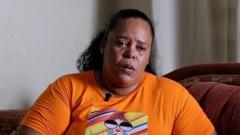In a shocking twist of fate, Myrelis Casique López discovered that her son, who she thought was safely returning to Venezuela, had instead been taken to a maximum-security facility in El Salvador, amidst claims that he is a gang member.
Mother's Heartbreak: Son Deported to Notorious El Salvador Prison Despite Claim of Innocence

Mother's Heartbreak: Son Deported to Notorious El Salvador Prison Despite Claim of Innocence
A Venezuelan mother's agony unfolds as her son, deported from the US, is identified in chilling prison footage.
In the bustling streets of Maracay, Venezuela, Myrelis Casique López awaited the return of her son, 24-year-old Francisco José García Casique, after an 18-month journey in the US. On Saturday, she learned he was being deported back to the capital, Caracas. Mesmerized by what she believed was a promising turn of events, she quickly learned otherwise when she discovered him featured in a TV report on Sunday.
"What I saw shocked me," she said, detailing how she recognized her son in harrowing footage showing him and others being taken to the Terrorism Confinement Centre in El Salvador, a notorious mega-jail known for human rights violations. “It’s him,” she insisted, pointing at the screen, where he sat among a group of men in shackles, seemingly marked by tattoos that led authorities to suspect gang affiliations.
US immigration officials asserted that all deportees had been thoroughly vetted and categorized as members of the Tren de Aragua gang, an organization linked to serious crimes such as drug smuggling and human trafficking. However, many, including Garcia's family, contest these allegations.
"He's not a criminal,” Myrelis emphasized, sharing that her son had left Venezuela amid escalating violence and economic strife. Garcia’s family had believed he had traveled to the US seeking legitimate opportunities, having worked diligently in a Peru-based barber shop prior to crossing into the US this past September.
As families of other identified detainees echoed similar sentiments, the emotional toll of the unprecedented deportations was felt throughout the Venezuelan diaspora. Many expressed fears of unjust deportations, citing that tattoos could lead to wrongful gang associations and a lack of due process—issues fueled by the Trump administration's recent crackdowns on illegal immigration.
The deportation initiative has cast fears among Venezuelan nationals in the US, with advocates warning that the low threshold for identifying gang members means innocent lives could be at risk.
Adelys Ferro, director of the Venezuelan-American Caucus, highlighted the insecurities felt by the community. “We don’t know what decisions to make — it’s a very precarious situation,” she stated.
As Myrelis clutches photographs of her son, she hangs onto hope, repeatedly voicing, “He doesn’t deserve this.” In a community that has largely supported the Trump administration due to its strong stance against the Maduro regime, there is rising apprehension about the repercussions these deportations could potentially create for innocent individuals like García.
As reports continue to unfold, the uncertain future for many Venezuelans in the US looms larger, echoing stories of desperation and fear invoking memories of the hardships they fled from in their home country.





















